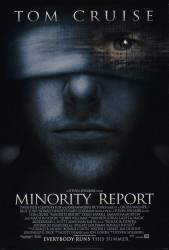Audio problem: When John Anderton's wife throws John's eyeball (stored in a clear plastic bag) onto Tim Blake Nelson's pipe organ, an ongoing organ note is heard, implying that the weight of the eyeball is depressing a key or two. We then see a shot of the eyeball resting on the organ's keys, none of which are depressed. (02:01:20)
Audio problem: When the child asks her mother for a balloon from the balloon man, the mom's words don't match her lips. (01:36:50)







Answer: Well, there isn't really a simple solution, but here goes. For a pre-vision to form, there have be two things present within the range of the precog ability (which appears to be limited to the Washington area - regardless of the stated plan to take the programme countrywide, there's never any indication that the precogs can sense beyond that range). Firstly, someone with the intent to kill. Secondly, there has to be a target for that intent within the range of the precogs. Anderton is present, and has the intent within him to kill the man who took his son, but has no target - the real kidnapper is presumably either dead or beyond the precog ability. Burgess, by bribing Crow to pretend to be that man, has provided a viable target for Anderton's intent within the range of the precog ability, thus triggering the prevision, and beginning the chain of events.
Tailkinker ★
The above answers the question, but there do appear to be some time travel issues with this plot point in the movie. Burgess set things up for Crow to fake being the kidnapper and thus triggering Jon's desire to kill that person, everything starts by the pre-cogs seeing the future. If the pre-cogs did not exist or did not have the vision, Jon would have never known that Leo Crow existed and would have continued on without having killed anyone. This is unique within the movie, as the other murders would have been commited regardless of whether or not the pre-cogs saw it. In this case, the ONLY reason this murder occurred is because the pre-cogs saw it.
oldbaldyone
Thinking about this a little more, it could be conceivable that Burgess had planned a different option for Jon finding Crow. We just never saw that on screen, because the precogs changed everything to an alternative future timeline once they saw the original murder. Originally, Jon could have been triggered by Burgess himself, stating that they got a lead on his son's murder and pointing him to Crow.
oldbaldyone
No I think Burgess set it up so that Anderton would find Crow because of the precogs, not have a different plan set up before or else it could be possible Burgess himself would be visible in the prevision. He manipulated the system perfectly, he has done it before after all. He knows exactly how the precogs work so he is able to set it up so that it's untraceable. Except, except for the fact there is always a choice. Only then did it go wrong for him. This proves both true for Anderton and Burgess in the end.
lionhead